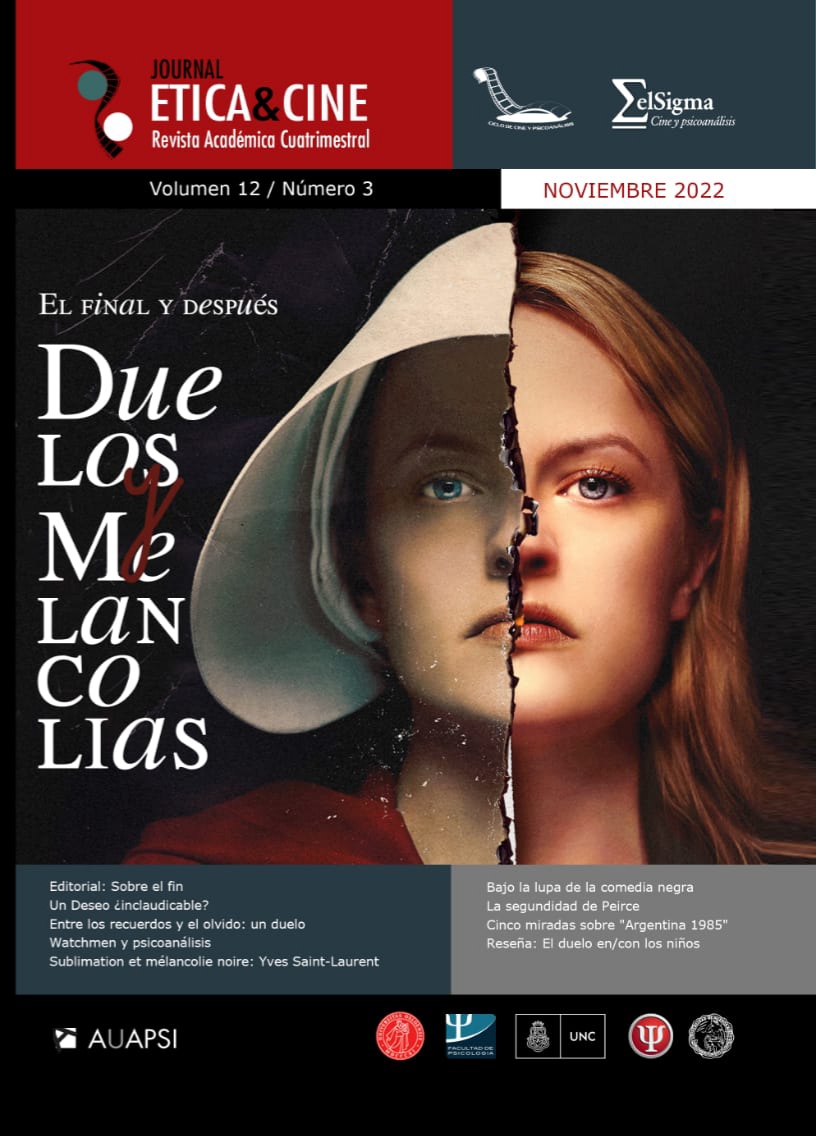Watchmen y psicoanálisis. Doomsday clock, and then…
DOI:
https://doi.org/10.31056/2250.5415.v12.n3.39642Keywords:
Psychoanalysis, Watchmen, EpochAbstract
Through the study of Watchmen in its 3 formats: comic, film and series, a dialogue with psychoanalysis is proposed, in order to extract readings that allow us to think about the time, characterized by the threat of cataclysms and large-scale war conflicts, in the framework of a generalized pandemic with its consequent impact on the population. The fantasy of the end of the world, present in Watchmen, is sustained by a common, trans-historical denominator: the object of jouissance, singular for each subject and, therefore, inseparable from his own history. On the one hand, the segregative effects to which the object as a kakón can lead are considered. On the other hand, it is evident how the series moves the bowels of the reactive field to which post-traumatic stress disorder (PTSD) has been circumscribed. As a counterpart, two key concepts are placed in view of the loss of the object: of satisfaction, in the trauma in its two times, and of love, in the duel, which will allow us to return to a reading of the epoch, when it became, not only as an impact, but mainly as an effect of the unique narratives of people’s lives.
References
Assef, J. (2013). La subjetividad hipermoderna. Una lectura de la época desde el cine, la semiótica y el psicoanálisis. Grama Ediciones.
Balzac, H. (2015). Las ilusiones perdidas. Penguim Clásicos.
Belaga, G. (2014). Trauma, angustia, síntoma. Desafíos de la biopolítica. Grama Ediciones.
Borges, J. L. (1952-1972 [2011]). El ruiseñor de Keats. En Obras completas 2. Sudamericana.
Carzoglio, L. y Marinaro, S. (2022). Shangai, esa otra Guerra. https://letraslibres.com/politica/shanghai-esa-otra-guerra/
Freud, S. (1927-1931 [2004]). El porvenir de una ilusión: El malestar en la cultura y otras obras. En Obras completas. Amorrortu Editores.
Freud, S. (1914-1916 [2013]). Contribución a la historia del movimiento psicoanalítico: Trabajos sobre metapsicología y otras obras. En Obras completas. Amorrortu Editores.
García, G. (2007). Fundamentos de la clínica analítica. En Serie intervenciones 1. Otium Ediciones.
Grinbaum, G. (2020). Una mujer sin maquillaje. Grama Ediciones.
Kripke, E., Rogen, S., Goldberg, E., Weaver, J., Moritz, N., Shetty, P., Marmur, O., Trachtenberg, D., Levin, K., Netter, J., Rosenberg, C., Sgriccia, P., Sonnenshine, R. (productores ejecutivos). (2019-2022). The Boys. [Serie de Televisión]. Amazon.
Lacan, J. (2012). Los escritos técnicos de Freud. En El seminario de Jacques Lacan. Libro 1. Paidós.
Lacan, J. (2012). Escritos 1. Siglo Veintiuno Editores.
Lacan, J. (2013). Escritos 2. Siglo Veintiuno Editores.
Lacan, J. (2015). Aún. En El seminario Jacques Lacan. Libro 20. Paidós.
Lindelof, D., Spezialy, D., Kassell, N., Williams, S., Iberti, S. (productores ejecutivos). (2019). Watchmen [Serie de Televisión]. HBO.
Miller, J. A. (1998). El hueso de un análisis. Tres Haches.
Miller, J.A. (2008). Del Edipo a la Sexuación. Paidós.
Miller, J. A. (2016). Un esfuerzo de poesía. Paidós.
Miller, J.A. (2015). EL racismo en la sociedad contemporánea. Consecuencias. Revista digital de psicoanálisis, arte y pensamiento, (16). http://www.revconsecuencias.com.ar/ediciones/016/default.php
Moore, A. (1986) Relojero. “Watchmen”, No. 4/12. Dic. de 1986. DC. Versión electrónica.
Moore, A. (1987) El abismo devuelve la Mirada. “Watchmen”, No. 6/12. Feb. de 1987. Versión electrónica.
Nietzsche, F. (2014). El ocaso de los ídolos. Gárgola.
Orlowski, J. (Director). (2020). El dilema de las redes sociales [Película]. Netflix.Página 12 (27 de octubre de 2022). “Los motivos de
Putin para ordenar “una operación militar especial”. https://www.pagina12.com.ar/403634-conflicto-rusia-ucrania-los-motivos-de-vladimir-putin-para-o
Ramirez, M. (2019). Los mundos de Watchmen. Ética & Cine, 9, (2), pp. 13-25. https://revistas.unc.edu.ar/index.php/eticaycine/
article/view/25087
Shakespeare, W. (2015). Hamlet. Penguim Random House Editorial.
Snyder, Z. (Director). (2009). Watchmen. [Película]. Legendary Pictures, DC Entertainment.
Tendlarz, S. E. (1992) El uso de la ciencia. Extraído el 15/09/22 de: http://www.silviaelenatendlarz.com/index.php?file=Articulos/
Otras-tematicas/El-uso-de-la-ciencia.html
Tendlarz, S. E. (2019). El sujeto cautivo por la guerra. Revista AJAYU, 17 (1), pp. 172–188. https://ajayu.ucb.edu.bo/a/article/
view/21
Wajcman y otros (2014). Arte y psicoanálisis. El vacío y la representación. Editorial Brujas.
Downloads
Published
Issue
Section
License
Copyright (c) 2022 Ética y Cine Journal

This work is licensed under a Creative Commons Attribution-ShareAlike 4.0 International License.
Los autores que publiquen en Ética y Cine Journal aceptan las siguientes condiciones:
Los autores/as conservan los derechos de autor © y permiten la publicación a Ética y Cine Journal, bajo licencia CC BY-SA / Reconocimiento - Reconocimiento-CompartirIgual 4.0 Internacional. La adopción de esta licencia permite copiar, redistribuir, comunicar públicamente la obra, reconociendo los créditos de la misma, y construir sobre el material publicado, debiendo otorgar el crédito apropiado a través de un enlace a la licencia e indicando si se realizaron cambios.

Este obra está bajo una licencia de Creative Commons Reconocimiento-CompartirIgual 4.0 Internacional.




